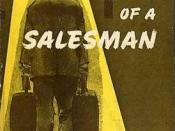Tragedy was a very controversial issue in literature until recent years. Recent figures in literature have set a clear definition for tragedy. Author Miller is one of these figures. Plays and novels have distinguished the definition of tragedy. According to the Merriam-Webster Dictionary tragedy is a serious piece of literature typically describing a conflict between the protagonist and a superior force and having a sorrowful or disastrous conclusion that excites pity or terror. Miller's explains that a tragic hero does not always have to be a monarch or a man of a higher status. A tragic hero can be a common person. A tragedy does not always have to end pessimistically; it could have an optimistic ending. The play Death of a Salesman, by Arthur Miller, is a tragedy because it's hero, Willy Loman, is a tragic figure that faces a superior source, being the American dream and the struggle for success.
Loman also excites pity in the reader because of his defeat and his inability to become a success or teach his children how to make their lives successful.
Miller defines a flaw as "an inherent unwillingness to remain passive in the face of what one conceives to be a challenge to one's dignity..." Loman fulfills many of the requirements of being a tragic hero. Willy is not "flawless" in his actions, which by Miller's standards make him a tragic hero. It is not wrong for Willy to have flaws and it does not make him a weaker man but a tragic figure. Miller designed the play so that Willy could be a tragic hero and for this he needs to have a flaw. Willy's flaw is that he is unable to see things in a more realistic perspective. Charley says something in the play that sums up...


